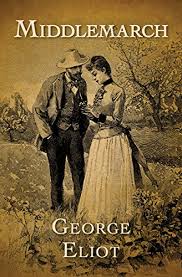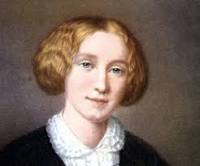Middlemarch Page #28
Middlemarch, A Study of Provincial Life is a novel by the English author George Eliot, appearing in eight instalments in 1871 and 1872. Set in a fictitious Midlands town from 1829 to 1832, it follows distinct, intersecting stories with many characters.
“Oh, if you talk in that sense!” said Mr. Standish, with as much disgust at such non-legal quibbling as a man can well betray towards a valuable client. “I should be glad of any treatment that would cure me without reducing me to a skeleton, like poor Grainger,” said Mr. Vincy, the mayor, a florid man, who would have served for a study of flesh in striking contrast with the Franciscan tints of Mr. Bulstrode. “It’s an uncommonly dangerous thing to be left without any padding against the shafts of disease, as somebody said,—and I think it a very good expression myself.” Mr. Lydgate, of course, was out of hearing. He had quitted the party early, and would have thought it altogether tedious but for the novelty of certain introductions, especially the introduction to Miss Brooke, whose youthful bloom, with her approaching marriage to that faded scholar, and her interest in matters socially useful, gave her the piquancy of an unusual combination. “She is a good creature—that fine girl—but a little too earnest,” he thought. “It is troublesome to talk to such women. They are always wanting reasons, yet they are too ignorant to understand the merits of any question, and usually fall back on their moral sense to settle things after their own taste.” Evidently Miss Brooke was not Mr. Lydgate’s style of woman any more than Mr. Chichely’s. Considered, indeed, in relation to the latter, whose mind was matured, she was altogether a mistake, and calculated to shock his trust in final causes, including the adaptation of fine young women to purplefaced bachelors. But Lydgate was less ripe, and might possibly have experience before him which would modify his opinion as to the most excellent things in woman. Miss Brooke, however, was not again seen by either of these gentlemen under her maiden name. Not long after that dinner-party she had become Mrs. Casaubon, and was on her way to Rome. CHAPTER XI. But deeds and language such as men do use, And persons such as comedy would choose, When she would show an image of the times, And sport with human follies, not with crimes. —BEN JONSON. Lydgate, in fact, was already conscious of being fascinated by a woman strikingly different from Miss Brooke: he did not in the least suppose that he had lost his balance and fallen in love, but he had said of that particular woman, “She is grace itself; she is perfectly lovely and accomplished. That is what a woman ought to be: she ought to produce the effect of exquisite music.” Plain women he regarded as he did the other severe facts of life, to be faced with philosophy and investigated by science. But Rosamond Vincy seemed to have the true melodic charm; and when a man has seen the woman whom he would have chosen if he had intended to marry speedily, his remaining a bachelor will usually depend on her resolution rather than on his. Lydgate believed that he should not marry for several years: not marry until he had trodden out a good clear path for himself away from the broad road which was quite ready made. He had seen Miss Vincy above his horizon almost as long as it had taken Mr. Casaubon to become engaged and married: but this learned gentleman was possessed of a fortune; he had assembled his voluminous notes, and had made that sort of reputation which precedes performance,—often the larger part of a man’s fame. He took a wife, as we have seen, to adorn the remaining quadrant of his course, and be a little moon that would cause hardly a calculable perturbation. But Lydgate was young, poor, ambitious. He had his half-century before him instead of behind him, and he had come to Middlemarch bent on doing many things that were not directly fitted to make his fortune or even secure him a good income. To a man under such circumstances, taking a wife is something more than a question of adornment, however highly he may rate this; and Lydgate was disposed to give it the first place among wifely functions. To his taste, guided by a single conversation, here was the point on which Miss Brooke would be found wanting, notwithstanding her undeniable beauty. She did not look at things from the proper feminine angle. The society of such women was about as relaxing as going from your work to teach the second form, instead of reclining in a paradise with sweet laughs for bird-notes, and blue eyes for a heaven. Certainly nothing at present could seem much less important to Lydgate than the turn of Miss Brooke’s mind, or to Miss Brooke than the qualities of the woman who had attracted this young surgeon. But any one watching keenly the stealthy convergence of human lots, sees a slow preparation of effects from one life on another, which tells like a calculated irony on the indifference or the frozen stare with which we look at our unintroduced neighbor. Destiny stands by sarcastic with our dramatis personae folded in her hand. Old provincial society had its share of this subtle movement: had not only its striking downfalls, its brilliant young professional dandies who ended by living up an entry with a drab and six children for their establishment, but also those less marked vicissitudes which are constantly shifting the boundaries of social intercourse, and begetting new consciousness of interdependence. Some slipped a little downward, some got higher footing: people denied aspirates, gained wealth, and fastidious gentlemen stood for boroughs; some were caught in political currents, some in ecclesiastical, and perhaps found themselves surprisingly grouped in consequence; while a few personages or families that stood with rocky firmness amid all this fluctuation, were slowly presenting new aspects in spite of solidity, and altering with the double change of self and beholder. Municipal town and rural parish gradually made fresh threads of connection—gradually, as the old stocking gave way to the savings-bank, and the worship of the solar guinea became extinct; while squires and baronets, and even lords who had once lived blamelessly afar from the civic mind, gathered the faultiness of closer acquaintanceship. Settlers, too, came from distant counties, some with an alarming novelty of skill, others with an offensive advantage in cunning. In fact, much the same sort of movement and mixture went on in old England as we find in older Herodotus, who also, in telling what had been, thought it well to take a woman’s lot for his starting-point; though Io, as a maiden apparently beguiled by attractive merchandise, was the reverse of Miss Brooke, and in this respect perhaps bore more resemblance to Rosamond Vincy, who had excellent taste in costume, with that nymph-like figure and pure blindness which give the largest range to choice in the flow and color of drapery. But these things made only part of her charm. She was admitted to be the flower of Mrs. Lemon’s school, the chief school in the county, where the teaching included all that was demanded in the accomplished female—even to extras, such as the getting in and out of a carriage. Mrs. Lemon herself had always held up Miss Vincy as an example: no pupil, she said, exceeded that young lady for mental acquisition and propriety of speech, while her musical execution was quite exceptional. We cannot help the way in which people speak of us, and probably if Mrs. Lemon had undertaken to describe Juliet or Imogen, these heroines would not have seemed poetical. The first vision of Rosamond would have been enough with most judges to dispel any prejudice excited by Mrs. Lemon’s praise.
Translation
Translate and read this book in other languages:
Select another language:
- - Select -
- 简体中文 (Chinese - Simplified)
- 繁體中文 (Chinese - Traditional)
- Español (Spanish)
- Esperanto (Esperanto)
- 日本語 (Japanese)
- Português (Portuguese)
- Deutsch (German)
- العربية (Arabic)
- Français (French)
- Русский (Russian)
- ಕನ್ನಡ (Kannada)
- 한국어 (Korean)
- עברית (Hebrew)
- Gaeilge (Irish)
- Українська (Ukrainian)
- اردو (Urdu)
- Magyar (Hungarian)
- मानक हिन्दी (Hindi)
- Indonesia (Indonesian)
- Italiano (Italian)
- தமிழ் (Tamil)
- Türkçe (Turkish)
- తెలుగు (Telugu)
- ภาษาไทย (Thai)
- Tiếng Việt (Vietnamese)
- Čeština (Czech)
- Polski (Polish)
- Bahasa Indonesia (Indonesian)
- Românește (Romanian)
- Nederlands (Dutch)
- Ελληνικά (Greek)
- Latinum (Latin)
- Svenska (Swedish)
- Dansk (Danish)
- Suomi (Finnish)
- فارسی (Persian)
- ייִדיש (Yiddish)
- հայերեն (Armenian)
- Norsk (Norwegian)
- English (English)
Citation
Use the citation below to add this book to your bibliography:
Style:MLAChicagoAPA
"Middlemarch Books." Literature.com. STANDS4 LLC, 2024. Web. 26 Nov. 2024. <https://www.literature.com/book/middlemarch_242>.




Discuss this Middlemarch book with the community:
Report Comment
We're doing our best to make sure our content is useful, accurate and safe.
If by any chance you spot an inappropriate comment while navigating through our website please use this form to let us know, and we'll take care of it shortly.
Attachment
You need to be logged in to favorite.
Log In